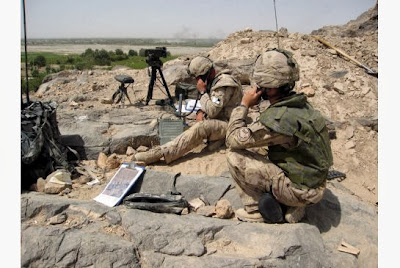Afghan war driven first and foremost by political or military priorities. Nation-building considerations were window dressing, writes Hamida Ghafour.
 | |||
| The Canadian Press / File Photo | The Canadian-led Operation Medusa in September 2006 was meant to fend off the Taliban encroaching on Kandahar, but it didn't result in a NATO victory. |
In the summer of 2011, a farmer from Zangabad, a cluster of villages south of Kandahar city, in Afghanistan’s violent Panjwai valley, learned some earth-shattering news. The hectare of vineyards he owned, a patch of land that had fed his family for several generations, had been demolished. A Canadian-funded road crew in an armoured bulldozer razed the farm to make way for a new road that would shorten the journey to Kandahar from one hour to 30 minutes.
The farmer was emotional as he spoke to Canadian Graeme Smith. He told the award-winning former foreign correspondent that he was given a $350 compensation payment from the Afghan government, not nearly enough to make up for thousands of dollars in damages.
A Canadian officer explained that the local authorities approved the plan and, in theory, the farmer saw the benefit of the road, writes Smith in a new book, The Dogs Are Eating Them Now, a smart and incisive account of the war in southern Afghanistan.
The farmer planned to bide his time. When the Canadian troops pulled out of Kandahar for good, he would kill the local district chief who had decided the road would cut across his property.
“I will take revenge against the people who guided the foreigners,” he told Smith.
Afghan nation building now seems as quaint a notion as the horse and buggy. The received wisdom today is that the place is a lost cause, Washington is desperate to cut a peace deal with the Taliban and get its troops out as safely as possible by next year.
But it is worth remembering that, while the war was sold as a humanitarian mission, nation-building considerations were, in reality, window dressing.
Operation Enduring Freedom was a careful sales pitch. The Bush administration in November 2001 brought together a team of public relations executives, and opened the Coalition Information Centers in London, Washington and Islamabad to counter the Taliban narrative. Justifying the U.S. air campaign as a way to end the oppression of Afghan women was a key and successful message.
“The fight against terrorism is also a fight for the rights and dignity of women,” Laura Bush said in a Thanksgiving radio address in November 2001 as the American invasion was underway.
Of course, the Taliban’s reprehensible attitudes and viciousness toward women wasn’t U.S. propaganda. The trouble is, the Afghan war was driven first and foremost by political or military priorities.
Sherard Cowper-Coles, the former British ambassador to Afghanistan, noted in Cables from Kabul, his scathing assessment of U.S.-U.K. diplomacy, that the British spent $113 million in taxpayer money on widening airstrips in Kandahar for Tornado jets. The jets were never needed.
Examples abound. The 480-kilometre road linking Kabul to Kandahar, inaugurated in 2003 and once dubbed Bush’s Highway because most of the $250-million project was paid for with American money, was supposed be a showcase of the U.S. building critical infrastructure. Today, Highway One is a no-go zone pockmarked with craters due to the hundreds of bombs set off by insurgents, who are also kidnapping and murdering people on the road. Only the desperate — Afghan civilians — use it.
An engineer with the American company that built the highway once told me the road’s main purpose was to give North Atlantic Treaty Organization military convoys access to the southern region and allow them to avoid dirt roads where insurgents could easily hide bombs.
There has been far too much trust in grandiose projects and high-tech weapons, and not enough on the painstaking and sometimes boring details that give a true picture.
Operation Medusa was an example of the disconnect between the military and political decision-makers and what was actually going on, as Smith illustrates.
The Canadian-led offensive in September 2006 was meant to stave off the Taliban encroaching on Kandahar and the Panjwai valley. Twelve Canadian soldiers were killed. Even if Prime Minister Stephen Harper declared at the time that “the Taliban are on the run,” Operation Medusa did not result in a NATO victory, Smith points out.
No comments:
Post a Comment